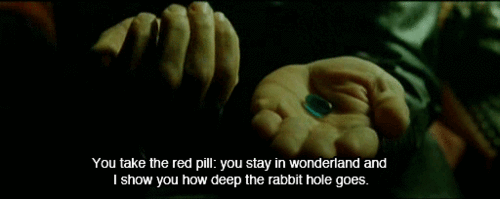How to overcome information overload
I had written this quite a while ago. I recently made some updates to it and now I got around to posting it. Hope you find it helpful. Enjoy! – George

“What information consumes is rather obvious: it consumes the attention of its recipients.
Hence a wealth of information creates a poverty of attention, and a need to allocate that attention efficiently among the overabundance of information sources that might consume it.”
– Herbert Simon
What is information overload: Information overload is the state in which someone has received so much information that their brain is literally “overloaded.” This causes confusion, indecisiveness, and inaction.
Why you need to overcome information overload: If you don’t overcome information overload, you will likely:
- Stay frozen
- Be stressed out
- Miss out on life opportunities
- Just get older with nothing to show for it.
- Which means that information overload sucks.
What will happen if you DO overcome information overload:
If you DO overcome information overload, you will likely:
- Start taking action.
- Feel more relaxed.
- Take advantage of opportunities.
- Do something worthwhile with your life.
The REAL root causes of information overload:
Freedom of speech: Yes, freedom of speech sounds cool and it definitely has its benefits. But here’s the thing: In today’s digital world, everyone can set up a blog, start a forum thread, write an article, publish an ebook or create a video. Everyone has an opinion and now a way to express that opinion. When you have 3 “voices” to listen to, that’s ok. When the voices get 300 or 3,000, confusion ensues.
Conflicting information: If all the above “3000” voices were saying the exact same thing, there wouldn’t be a problem. Only they don’t. Each person has an agenda and everyone thinks that their way is the “best.” Should you write articles? Do audio? Create videos? Become an affiliate marketer? Create your own products? Promote Amazon or Clickbank products? What about Adsense? Should you do SEO or PPC? What about press releases?
Advertisers have become smarter: The truth is that companies (or anyone who wants to sell you something) know what “buttons” to push. They know that our “monkey brain” wants the quick and easy fix. They know we like entertainment and excitement. So, they tailor these messages to these needs. As soon as you see a new ad, you get pulled to it.
Not having a clear goal: Most people have zero clue what they want in life. They SAY they know but they DON’T. They “borrow” goals from their immediate environment like friends, family or “online buddies.” But is what those people want the best for you? Without an “end” in mind, how can you even BEGIN to gather the info YOU need?
Not knowing YOUR strengths and weaknesses: People fall in the trap that “If that technique worked for guru so and so, then it will work for me too.” That assumption would be somewhat accurate IF your brain was wired in the exact same way as said guru’s, if you had the same experience and if you had the same talents. Without knowing what you are good and not good at, you can’t find the right opportunities or avoid the pitfalls.
Not having a proven process for making decisions: Most people don’t have a system for making decisions. Yes, a system is required, especially when we talk about issues so crucial to survival as making money. Add to that the fact that people don’t have a clear view of reality to begin with and things get even tougher.
The wrong assumption that our brains are super computers: Yes, our brains CAN compute things but they do NOT have an infinite capacity for data storage. It’s not like our brains are machines that can hold 300 terabytes of info, perfectly organized. We are forgetful.
Low self esteem: Most people have issues with self esteem. That’s why they look for information from other so-called “high-status” individuals. Unless we improve our self esteem, it doesn’t matter how much info we take in – we will always want more. Which leads us to…
Guru groupie syndrome: When authorities within a niche publish content, people tend to react in different ways. Some become skeptical, some become haters and some become “groupies” that follow gurus around like puppies. “Did you hear about this? It’s true! Guru XYZ said it!”
Poor organizational skills: The same information is available to everyone. But those who can’t organize it well enough will be at a tremendous advantage in relation to those who can.
Boredom in every-day life: It’s simple. We get bored. We want to be entertained. We visit Facebook, Youtube, or our favourite forum. We get distracted by other people’s stuff. Game over.
Biting off more than you can chew: Many people overestimate their powers. They create these complex plans that they think will be able to follow. Then, the system doesn’t work. Then, they try to digest huge amounts of information in order to find out what’s “wrong” with the system and how to “make it work.”
Being a maximiser: Maximisers are the people who always want to figure out every little detail in order to make the “best” decision or make the best “deal.” For example, someone will research about a new laptop model for 6 months before deciding which one to buy. These people don’t understand the value of time or how to make quick but proper decisions.
How to overcome information overload:
See the truth for what it is: Understand that different things work for different people. For example:
- Some people make money with SEO and some people don’t.
- Some people make money with PPC and some people don’t.
- Some people make money with affiliate marketing and some people don’t.
- Some people make money with creating their own products and some people don’t.
- Some people make money with eBay and some people don’t.
- Some people make money with article marketing and some people don’t.
Don’t get too attached to a single perspective. That’s like a jail that will keep you imprisoned for ever. If you think that there’s only one way to do something, then you never allow something better to enter your life.
Define your strengths and weaknesses: This will help you see what is the plan that is likely to work well for you, as well as what types of business models are likely to not work with you. For example, if you hate writing and don’t know how to manage other writers, then creating an article-writing website will likely not be your ticket.
Create a spreadsheet. Two columns. Column 1: Strengths. Column 2: Weaknesses. Write for as long as you need in order to get an accurate picture of yourself.

Set clear on your goals: What do you want to achieve? What do you want your life to be like? Do you want to devote 12 hours a day in order to make $30,000 a month by being a programmer? Or do you want to devote 2 hours a day in order to make $1,000 a month by writing articles for others?
Decide on and write down a specific business plan: Yes, I know you don’t want to do it. But, writing it is the easy part. If you can’t even get it down on paper, don’t expect to be able to follow through and take the necessary steps in real life. In order to decide, have a balanced perspective.
Note down as many pros AND cons of ALL the main business plans you think you want to follow (typically 2-3). Examples:
“I’m a good writer. Writing burns me out.”
“I know how to do SEO. It takes time and I’m impatient.”
Keep BOTH sides of the coin in front of you at all times. The minute you start becoming biased about a specific method, you are in deep trouble.
Decide what info is relevant to you and what isn’t: Once you write down your final plan, something interesting will happen: All the info that has nothing to do with this plan will now become irrelevant.
If you only decide that you will promote your business with article marketing, stop worrying about info on Google Adwords. Make a conscious decision that you will not read about an irrelevant technique. No books. No videos. No articles. No forum threads. No special reports. No emails. No nothing.
Organize the info on your PC: I have a folder on my PC called “Systems.” In that folder I have several subfolder like: Content, Mindset, Traffic, Web design, Business Models, etc. In each of those folders, I have special reports that I write for myself.
For example, in the “Mindset” folder you may see reports like: “Patience”, “Fear of Failure”, “Master Inner Conflict” etc. Every time I come across a new piece of information, I add it to the proper special report. Then, when I need info on something, I just open the special report on my computer. For example: “Headline Ideas.”
Learn how to search for information: When most people want to learn about something, they type on Google a random search string and hope for the best. For example: hardgainer
Although that can help, I prefer going to my favorite information sources within my niche and looking for the specific info in those sources. For example:
intitle:hardgainer site:bodybuilding.com
ntitle:hardgainer site:t-nation.com
If I read all the posts in the forum threads on the Google results above, I will get 100 different perspectives – and not just one or two. This increases the chances that I will get a more balanced view of reality – which will lead to better decisions.
Timebox your entertainment: If you want to watch funny videos or browse your favorite forums, you may want to set aside a specific time for that. Either once a week or maybe every day but after you have done the main business tasks in your day. That way, you’ll know that you will get your “fix”, without having that mess up your entire day.
The problem with entertainment isn’t that you’ll get distracted for a while. It’s that it is so much fun that you may start looking for info on things that are unrelated to your business or life. For example: “Justin Bieber news.” Entertaining info can also overload our brain.
Become a satisficer: A satisficer is someone who can take quick action that is good enough and be satisfied with it – without worrying that he didn’t get everything perfect. Perfection is the enemy of good enough. Follow your gut, make a decision, and act. Course correct where necessary.
Reverse the problem: Instead of consuming even more information, STOP and instead get it out of your head and on paper. When I feel confused or overwhelmed by information and the choices I have, I shut down my PC, take pen and paper, and drive to a nice place (I prefer in front of the sea). Then, I will start taking the disorganized bits of info in my brain and putting them on paper.
When you do that, your brain doesn’t have to hold on to them any more. It’s like you are freeing up some “RAM” memory. Once you see your different thoughts on paper, it’s much easier to organize them.
You can see what bits of info conflict with each other, you can locate the sticking points and address them. It’s better to do this type of analysis on paper, rather than inside your head.

“Be a collector of good ideas, but don’t trust your memory.
The best collecting place for all of the ideas and information that comes your way is your journal.”
– Jim Rohn
What to do now:
If you suffer from information overload, then you may have gotten the inaction habit. Too much reading, not enough doing. Inertia can be hard to overcome. For example, you may now be tempted to say “cool ideas, let’s browse the internet now.” I encourage you to take small steps towards overcoming information overload.
Here are a few examples:
- Install a blocking software like K9 Web Protection, Leechblock for Firefox or StayFocusd for Chrome. Add the most time-wasting sites to them. That way, you won’t have to use your own will power trying to resist the different online temptations.
- Create a spreadsheet and make a list of your strengths and weaknesses.
- Write down what you you want your business to look like (it doesn’t even have to be a “real business.” Even if you want to just “make money”. that’s fine. But have a plan for it.)
- Take the next BABY STEP towards your goals.
“This is your last chance. After this, there is no turning back. You take the blue pill – you keep feeling confused and keep looking for more mental masturbation all your life. You take the red pill – you stop information overload and you discover how far you can go in this world…”



Let me know how information overload is affecting you and if you found something helpful this post. Post your comment below! :-)
Totally agree with you…
Information overload = inaction. I’ve personally found myself in the same situation.
Only by cutting off emails (especially those offering the next shiny objects) and the WIFI helps me get some serious work done. If I can focus one whole day on a project, a lot can be done actually. :)
Hello my friend,
Information Overload is certainly a big issue now & good subject to write about.
I had already took action & unsubscribed from many marketers lists.
Too many allow themselves even to send few promotional Email a day.
I wonder who stays with them & why :)
I also wrote few promoters that give a huge bonuses, that I would prefer
a good one effective than all dozens that I have no time to study :)
They must be ignored to avoid overload.
Thanks for raising it up & Enjoy Life :)
Ahrale
Thanks, Ahrale!
Well said!!
:-)
Great read George! I’ll have to look this over again. Lot’s of good info.
Thanks,
James
Thank you, sir!
Even your post is also too much of information
Hope you won’t mind my frankness !
Haha, the irony of it, eh? Point taken! :-)
It’s been long I read an article from you, George. You know, sometimes, we all try to avoid anything promotional. But this is a goldmine. I bookmarked and even saved a copy to my hard disk for later reading. I have a serious problem with information overload. I browse the internet for hours daily and end up with headaches most time. Your article is a step in the right direction for me.
Thank you very much!
Glad you find it helpful, Eben!